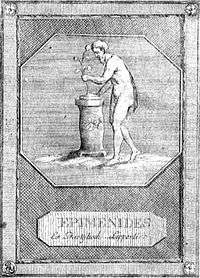Epimenides

Epimenides of Knossos (Crete) (/ɛpɪˈmɛnɪdiːz/; Greek: Ἐπιμενίδης) was a semi-mythical 7th or 6th century BC Greek seer and philosopher-poet.
Life
While tending his father's sheep, Epimenides is said to have fallen asleep for fifty-seven years in a Cretan cave sacred to Zeus, after which he reportedly awoke with the gift of prophecy (Diogenes Laërtius i. 109–115). Plutarch writes that Epimenides purified Athens after the pollution brought by the Alcmeonidae, and that the seer's expertise in sacrifices and reform of funeral practices were of great help to Solon in his reform of the Athenian state. The only reward he would accept was a branch of the sacred olive, and a promise of perpetual friendship between Athens and Cnossus (Plutarch, Life of Solon, 12; Aristotle, Ath. Pol. 1).
Athenaeus also mentions him, in connection with the self-sacrifice of the erastes and eromenos pair of Cratinus and Aristodemus, who were believed to have given their lives in order to purify Athens. Even in antiquity there were those who held the story to be mere fiction (The Deipnosophists, XIII. 78–79). Diogenes Laërtius preserves a number of spurious letters between Epimenides and Solon in his Lives of the Philosophers. Epimenides was also said to have prophesied at Sparta on military matters.
He died in Crete at an advanced age; according to his countrymen, who afterwards honoured him as a god, he lived nearly three hundred years. According to another story, he was taken prisoner in a war between the Spartans and Cnossians, and put to death by his captors, because he refused to prophesy favourably for them. Pausanias reports that when Epimenides died, his skin was found to be covered with tattooed writing. This was considered odd, because the Greeks reserved tattooing for slaves. Some modern scholars have seen this as evidence that Epimenides was heir to the shamanic religions of Central Asia, because tattooing is often associated with shamanic initiation. The skin of Epimenides was preserved at the courts of the ephores in Sparta, conceivably as a good-luck charm. Epimenides is also reckoned with Melampus and Onomacritus as one of the founders of Orphism.
According to Diogenes Laertius, Epimenides met Pythagoras in Crete, and they went to the Cave of Ida.[1]
Works

Several prose and poetic works, now lost, were attributed to Epimenides, including a theogony, an epic poem on the Argonautic expedition, prose works on purifications and sacrifices, a cosmogony, oracles, a work on the laws of Crete, and a treatise on Minos and Rhadymanthus.
Cretica
Epimenides' Cretica (Κρητικά) is quoted twice in the New Testament. Its only source is a 9th-century Syriac commentary by Isho'dad of Merv on the Acts of the Apostles, discovered, edited and translated (into Greek) by Prof. J. Rendel Harris in a series of articles in the Expositor (Oct. 1906, 305–17; Apr. 1907, 332–37; Apr. 1912, 348–353).
In the poem, Minos addresses Zeus thus:
Τύμβον ἐτεκτήναντο σέθεν, κύδιστε μέγιστε, |
They fashioned a tomb for you, holy and high one, |
The "lie" of the Cretans is that Zeus was mortal; Epimenides considered Zeus immortal. "Cretans, always liars," with the same theological intent as Epimenides, also appears in the Hymn to Zeus of Callimachus. The fourth line is quoted (with a reference to one of "your own poets") in Acts of the Apostles, chapter 17, verse 28.
The second line is quoted, with a veiled attribution ("a prophet of their own"), in the Epistle to Titus, chapter 1, verse 12, to warn Titus about the Cretans. The "prophet" in Titus 1:12 is identified by Clement of Alexandria as Epimenides (Stromata, i. 14). In this passage, Clement mentions that "some say" Epimenides should be counted among the seven wisest philosophers.
Chrysostom (Homily 3 on Titus) gives an alternative fragment:
- For even a tomb, King, of you
- They made, who never died, but ever shall be.
Epimenides paradox
It is not clear when Epimenides became associated with the Epimenides paradox, a variation of the liar paradox. Epimenides himself does not appear to have intended any irony or paradox in his statement "Cretans, always liars." In the epistle to Titus, there is a warning that "One of themselves, even a prophet of their own, said, the Cretians are alway liars, evil beasts, slow bellies." In the Middle Ages, many forms of the liar paradox were studied under the heading of insolubilia, but these were not associated with Epimenides.
See also
Notes
- ↑ Hicks, R.D. (1972). "PYTHAGORAS (c. 582-500 B.C.)". Diogenes Laertius.
References
-
 This article incorporates text from a publication now in the public domain: Chisholm, Hugh, ed. (1911). "Epimenides". Encyclopædia Britannica. 9 (11th ed.). Cambridge University Press. p. 694.
This article incorporates text from a publication now in the public domain: Chisholm, Hugh, ed. (1911). "Epimenides". Encyclopædia Britannica. 9 (11th ed.). Cambridge University Press. p. 694.
Further reading
| Wikimedia Commons has media related to Epimenides. |
- Zaykov, Andrey. Epimemdes' activities in Sparta (In Russian + English summary). In: Journal of Ancient History. Moscow, 2002. No 4. P. 110-130.
 Laërtius, Diogenes (1925). "The Seven Sages: Epimenides". Lives of the Eminent Philosophers. 1:1. Translated by Hicks, Robert Drew (Two volume ed.). Loeb Classical Library.
Laërtius, Diogenes (1925). "The Seven Sages: Epimenides". Lives of the Eminent Philosophers. 1:1. Translated by Hicks, Robert Drew (Two volume ed.). Loeb Classical Library.- Epimenides of Crete Fragments at demonax.info